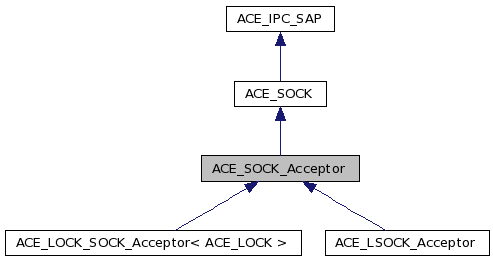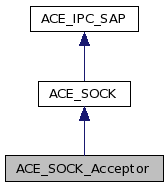Defines a factory that creates new ACE_Streams passively. More...
#include <SOCK_Acceptor.h>


Public Types | |
| typedef ACE_INET_Addr | PEER_ADDR |
| typedef ACE_SOCK_Stream | PEER_STREAM |
Public Member Functions | |
| ACE_SOCK_Acceptor (void) | |
| Default constructor. | |
| ACE_SOCK_Acceptor (const ACE_Addr &local_sap, int reuse_addr=0, int protocol_family=PF_UNSPEC, int backlog=ACE_DEFAULT_BACKLOG, int protocol=0) | |
| ACE_SOCK_Acceptor (const ACE_Addr &local_sap, ACE_Protocol_Info *protocolinfo, ACE_SOCK_GROUP g, u_long flags, int reuse_addr, int protocol_family=PF_UNSPEC, int backlog=ACE_DEFAULT_BACKLOG, int protocol=0) | |
| int | open (const ACE_Addr &local_sap, int reuse_addr=0, int protocol_family=PF_UNSPEC, int backlog=ACE_DEFAULT_BACKLOG, int protocol=0) |
| int | open (const ACE_Addr &local_sap, ACE_Protocol_Info *protocolinfo, ACE_SOCK_GROUP g, u_long flags, int reuse_addr, int protocol_family=PF_UNSPEC, int backlog=ACE_DEFAULT_BACKLOG, int protocol=0) |
| int | close (void) |
| Close the socket. Returns 0 on success and -1 on failure. | |
| ~ACE_SOCK_Acceptor (void) | |
| Default dtor. | |
| int | accept (ACE_SOCK_Stream &new_stream, ACE_Addr *remote_addr=0, ACE_Time_Value *timeout=0, bool restart=true, bool reset_new_handle=false) const |
| int | accept (ACE_SOCK_Stream &new_stream, ACE_Accept_QoS_Params qos_params, ACE_Addr *remote_addr=0, ACE_Time_Value *timeout=0, bool restart=true, bool reset_new_handle=false) const |
| void | dump (void) const |
| Dump the state of an object. | |
Public Attributes | |
| ACE_ALLOC_HOOK_DECLARE | |
| Declare the dynamic allocation hooks. | |
Protected Member Functions | |
| int | shared_accept_start (ACE_Time_Value *timeout, bool restart, int &in_blocking_mode) const |
| int | shared_accept_finish (ACE_SOCK_Stream new_stream, int in_blocking_mode, bool reset_new_handle) const |
| int | shared_open (const ACE_Addr &local_sap, int protocol_family, int backlog) |
Private Member Functions | |
| int | get_remote_addr (ACE_Addr &) const |
| Do not allow this function to percolate up to this interface... | |
Defines a factory that creates new ACE_Streams passively.
The ACE_SOCK_Acceptor has its own "passive-mode" socket. This serves as a factory to create so-called "data-mode" sockets, which are what the ACE_SOCK_Stream encapsulates. Therefore, by inheriting from ACE_SOCK, ACE_SOCK_Acceptor gets its very own socket.
Definition at line 39 of file SOCK_Acceptor.h.
Reimplemented in ACE_LSOCK_Acceptor.
Definition at line 135 of file SOCK_Acceptor.h.
Reimplemented in ACE_LSOCK_Acceptor.
Definition at line 136 of file SOCK_Acceptor.h.
| ACE_SOCK_Acceptor::ACE_SOCK_Acceptor | ( | void | ) |
Default constructor.
Definition at line 27 of file SOCK_Acceptor.cpp.
{
ACE_TRACE ("ACE_SOCK_Acceptor::ACE_SOCK_Acceptor");
}
| ACE_SOCK_Acceptor::ACE_SOCK_Acceptor | ( | const ACE_Addr & | local_sap, | |
| int | reuse_addr = 0, |
|||
| int | protocol_family = PF_UNSPEC, |
|||
| int | backlog = ACE_DEFAULT_BACKLOG, |
|||
| int | protocol = 0 | |||
| ) |
Initialize a passive-mode BSD-style acceptor socket (no QoS). local_sap is the address that we're going to listen for connections on. If reuse_addr is 1 then we'll use the SO_REUSEADDR to reuse this address.
Definition at line 383 of file SOCK_Acceptor.cpp.
| ACE_SOCK_Acceptor::ACE_SOCK_Acceptor | ( | const ACE_Addr & | local_sap, | |
| ACE_Protocol_Info * | protocolinfo, | |||
| ACE_SOCK_GROUP | g, | |||
| u_long | flags, | |||
| int | reuse_addr, | |||
| int | protocol_family = PF_UNSPEC, |
|||
| int | backlog = ACE_DEFAULT_BACKLOG, |
|||
| int | protocol = 0 | |||
| ) |
Initialize a passive-mode QoS-enabled acceptor socket. Returns 0 on success and -1 on failure.
Definition at line 325 of file SOCK_Acceptor.cpp.
| ACE_SOCK_Acceptor::~ACE_SOCK_Acceptor | ( | void | ) |
Default dtor.
Definition at line 8 of file SOCK_Acceptor.inl.
{
ACE_TRACE ("ACE_SOCK_Acceptor::~ACE_SOCK_Acceptor");
}
| int ACE_SOCK_Acceptor::accept | ( | ACE_SOCK_Stream & | new_stream, | |
| ACE_Addr * | remote_addr = 0, |
|||
| ACE_Time_Value * | timeout = 0, |
|||
| bool | restart = true, |
|||
| bool | reset_new_handle = false | |||
| ) | const |
Accept a new ACE_SOCK_Stream connection. A timeout of 0 means block forever, a timeout of {0, 0} means poll. restart == true means "restart if interrupted," i.e., if errno == EINTR. Note that new_stream inherits the "blocking mode" of this ACE_SOCK_Acceptor, i.e., if this acceptor factory is in non-blocking mode, the new_stream will be in non-blocking mode and vice versa.
Reimplemented in ACE_LOCK_SOCK_Acceptor< ACE_LOCK >.
Definition at line 105 of file SOCK_Acceptor.cpp.
{
ACE_TRACE ("ACE_SOCK_Acceptor::accept");
int in_blocking_mode = 0;
if (this->shared_accept_start (timeout,
restart,
in_blocking_mode) == -1)
return -1;
else
{
// On Win32 the third parameter to <accept> must be a NULL
// pointer if we want to ignore the client's address.
int *len_ptr = 0;
sockaddr *addr = 0;
int len = 0;
if (remote_addr != 0)
{
len = remote_addr->get_size ();
len_ptr = &len;
addr = (sockaddr *) remote_addr->get_addr ();
}
do
new_stream.set_handle (ACE_OS::accept (this->get_handle (),
addr,
len_ptr));
while (new_stream.get_handle () == ACE_INVALID_HANDLE
&& restart
&& errno == EINTR
&& timeout == 0);
// Reset the size of the addr, so the proper UNIX/IPv4/IPv6 family
// is known.
if (new_stream.get_handle () != ACE_INVALID_HANDLE
&& remote_addr != 0)
{
remote_addr->set_size (len);
if (addr)
remote_addr->set_type (addr->sa_family);
}
}
return this->shared_accept_finish (new_stream,
in_blocking_mode,
reset_new_handle);
}
| int ACE_SOCK_Acceptor::accept | ( | ACE_SOCK_Stream & | new_stream, | |
| ACE_Accept_QoS_Params | qos_params, | |||
| ACE_Addr * | remote_addr = 0, |
|||
| ACE_Time_Value * | timeout = 0, |
|||
| bool | restart = true, |
|||
| bool | reset_new_handle = false | |||
| ) | const |
Accept a new ACE_SOCK_Stream connection using the QoS information in qos_params. A timeout of 0 means block forever, a timeout of {0, 0} means poll. restart == true means "restart if interrupted," i.e., if errno == EINTR. Note that new_stream inherits the "blocking mode" of this ACE_SOCK_Acceptor, i.e., if this acceptor factory is in non-blocking mode, the new_stream will be in non-blocking mode and vice versa.
Definition at line 160 of file SOCK_Acceptor.cpp.
{
ACE_TRACE ("ACE_SOCK_Acceptor::accept");
int in_blocking_mode = 0;
if (this->shared_accept_start (timeout,
restart,
in_blocking_mode) == -1)
return -1;
else
{
// On Win32 the third parameter to <accept> must be a NULL
// pointer if we want to ignore the client's address.
int *len_ptr = 0;
int len = 0;
sockaddr *addr = 0;
if (remote_addr != 0)
{
len = remote_addr->get_size ();
len_ptr = &len;
addr = (sockaddr *) remote_addr->get_addr ();
}
do
new_stream.set_handle (ACE_OS::accept (this->get_handle (),
addr,
len_ptr,
qos_params));
while (new_stream.get_handle () == ACE_INVALID_HANDLE
&& restart
&& errno == EINTR
&& timeout == 0);
// Reset the size of the addr, which is only necessary for UNIX
// domain sockets.
if (new_stream.get_handle () != ACE_INVALID_HANDLE
&& remote_addr != 0)
remote_addr->set_size (len);
}
return this->shared_accept_finish (new_stream,
in_blocking_mode,
reset_new_handle);
}
| int ACE_SOCK_Acceptor::close | ( | void | ) |
Close the socket. Returns 0 on success and -1 on failure.
Reimplemented from ACE_SOCK.
Definition at line 401 of file SOCK_Acceptor.cpp.
{
return ACE_SOCK::close ();
}
| void ACE_SOCK_Acceptor::dump | ( | void | ) | const |
Dump the state of an object.
Reimplemented from ACE_SOCK.
Reimplemented in ACE_LSOCK_Acceptor.
Definition at line 213 of file SOCK_Acceptor.cpp.
{
#if defined (ACE_HAS_DUMP)
ACE_TRACE ("ACE_SOCK_Acceptor::dump");
#endif /* ACE_HAS_DUMP */
}
| int ACE_SOCK_Acceptor::get_remote_addr | ( | ACE_Addr & | ) | const [private] |
Do not allow this function to percolate up to this interface...
Reimplemented from ACE_SOCK.
| int ACE_SOCK_Acceptor::open | ( | const ACE_Addr & | local_sap, | |
| ACE_Protocol_Info * | protocolinfo, | |||
| ACE_SOCK_GROUP | g, | |||
| u_long | flags, | |||
| int | reuse_addr, | |||
| int | protocol_family = PF_UNSPEC, |
|||
| int | backlog = ACE_DEFAULT_BACKLOG, |
|||
| int | protocol = 0 | |||
| ) |
Initialize a passive-mode QoS-enabled acceptor socket. Returns 0 on success and -1 on failure.
Definition at line 297 of file SOCK_Acceptor.cpp.
{
ACE_TRACE ("ACE_SOCK_Acceptor::open");
if (protocol_family == PF_UNSPEC)
protocol_family = local_sap.get_type ();
if (ACE_SOCK::open (SOCK_STREAM,
protocol_family,
protocol,
protocolinfo,
g,
flags,
reuse_addr) == -1)
return -1;
else
return this->shared_open (local_sap,
protocol_family,
backlog);
}
| int ACE_SOCK_Acceptor::open | ( | const ACE_Addr & | local_sap, | |
| int | reuse_addr = 0, |
|||
| int | protocol_family = PF_UNSPEC, |
|||
| int | backlog = ACE_DEFAULT_BACKLOG, |
|||
| int | protocol = 0 | |||
| ) |
Initialize a passive-mode BSD-style acceptor socket (no QoS). local_sap is the address that we're going to listen for connections on. If reuse_addr is 1 then we'll use the SO_REUSEADDR to reuse this address. Returns 0 on success and -1 on failure.
Reimplemented in ACE_LSOCK_Acceptor.
Definition at line 351 of file SOCK_Acceptor.cpp.
{
ACE_TRACE ("ACE_SOCK_Acceptor::open");
if (local_sap != ACE_Addr::sap_any)
protocol_family = local_sap.get_type ();
else if (protocol_family == PF_UNSPEC)
{
#if defined (ACE_HAS_IPV6)
protocol_family = ACE::ipv6_enabled () ? PF_INET6 : PF_INET;
#else
protocol_family = PF_INET;
#endif /* ACE_HAS_IPV6 */
}
if (ACE_SOCK::open (SOCK_STREAM,
protocol_family,
protocol,
reuse_addr) == -1)
return -1;
else
return this->shared_open (local_sap,
protocol_family,
backlog);
}
| int ACE_SOCK_Acceptor::shared_accept_finish | ( | ACE_SOCK_Stream | new_stream, | |
| int | in_blocking_mode, | |||
| bool | reset_new_handle | |||
| ) | const [protected] |
Perform operations that must occur after <ACE_OS::accept> is called.
Definition at line 67 of file SOCK_Acceptor.cpp.
{
ACE_TRACE ("ACE_SOCK_Acceptor::shared_accept_finish ()");
ACE_HANDLE new_handle = new_stream.get_handle ();
// Check to see if we were originally in blocking mode, and if so,
// set the <new_stream>'s handle and <this> handle to be in blocking
// mode.
if (in_blocking_mode)
{
// Save/restore errno.
ACE_Errno_Guard error (errno);
// Only disable ACE_NONBLOCK if we weren't in non-blocking mode
// originally.
ACE::clr_flags (this->get_handle (),
ACE_NONBLOCK);
ACE::clr_flags (new_handle,
ACE_NONBLOCK);
}
#if defined (ACE_HAS_WINSOCK2) && (ACE_HAS_WINSOCK2 != 0)
if (reset_new_handle)
// Reset the event association inherited by the new handle.
::WSAEventSelect ((SOCKET) new_handle, 0, 0);
#else
ACE_UNUSED_ARG (reset_new_handle);
#endif /* ACE_WIN32 */
return new_handle == ACE_INVALID_HANDLE ? -1 : 0;
}
| int ACE_SOCK_Acceptor::shared_accept_start | ( | ACE_Time_Value * | timeout, | |
| bool | restart, | |||
| int & | in_blocking_mode | |||
| ) | const [protected] |
Perform operations that must occur before <ACE_OS::accept> is called.
Definition at line 35 of file SOCK_Acceptor.cpp.
{
ACE_TRACE ("ACE_SOCK_Acceptor::shared_accept_start");
ACE_HANDLE handle = this->get_handle ();
// Handle the case where we're doing a timed <accept>.
if (timeout != 0)
{
if (ACE::handle_timed_accept (handle,
timeout,
restart) == -1)
return -1;
else
{
in_blocking_mode = ACE_BIT_DISABLED (ACE::get_flags (handle),
ACE_NONBLOCK);
// Set the handle into non-blocking mode if it's not already
// in it.
if (in_blocking_mode
&& ACE::set_flags (handle,
ACE_NONBLOCK) == -1)
return -1;
}
}
return 0;
}
| int ACE_SOCK_Acceptor::shared_open | ( | const ACE_Addr & | local_sap, | |
| int | protocol_family, | |||
| int | backlog | |||
| ) | [protected] |
This method factors out the common <open> code and is called by both the QoS-enabled <open> method and the BSD-style <open> method.
Definition at line 221 of file SOCK_Acceptor.cpp.
{
ACE_TRACE ("ACE_SOCK_Acceptor::shared_open");
int error = 0;
#if defined (ACE_HAS_IPV6)
if (protocol_family == PF_INET6)
{
sockaddr_in6 local_inet6_addr;
ACE_OS::memset (reinterpret_cast<void *> (&local_inet6_addr),
0,
sizeof local_inet6_addr);
if (local_sap == ACE_Addr::sap_any)
{
local_inet6_addr.sin6_family = AF_INET6;
local_inet6_addr.sin6_port = 0;
local_inet6_addr.sin6_addr = in6addr_any;
}
else
local_inet6_addr = *reinterpret_cast<sockaddr_in6 *> (local_sap.get_addr ());
// We probably don't need a bind_port written here.
// There are currently no supported OS's that define
// ACE_LACKS_WILDCARD_BIND.
if (ACE_OS::bind (this->get_handle (),
reinterpret_cast<sockaddr *> (&local_inet6_addr),
sizeof local_inet6_addr) == -1)
error = 1;
}
else
#endif
if (protocol_family == PF_INET)
{
sockaddr_in local_inet_addr;
ACE_OS::memset (reinterpret_cast<void *> (&local_inet_addr),
0,
sizeof local_inet_addr);
if (local_sap == ACE_Addr::sap_any)
{
local_inet_addr.sin_port = 0;
}
else
local_inet_addr = *reinterpret_cast<sockaddr_in *> (local_sap.get_addr ());
if (local_inet_addr.sin_port == 0)
{
if (ACE::bind_port (this->get_handle (),
ACE_NTOHL (ACE_UINT32 (local_inet_addr.sin_addr.s_addr))) == -1)
error = 1;
}
else if (ACE_OS::bind (this->get_handle (),
reinterpret_cast<sockaddr *> (&local_inet_addr),
sizeof local_inet_addr) == -1)
error = 1;
}
else if (ACE_OS::bind (this->get_handle (),
(sockaddr *) local_sap.get_addr (),
local_sap.get_size ()) == -1)
error = 1;
if (error != 0
|| ACE_OS::listen (this->get_handle (),
backlog) == -1)
{
ACE_Errno_Guard g (errno); // Preserve across close() below.
error = 1;
this->close ();
}
return error ? -1 : 0;
}
Declare the dynamic allocation hooks.
Reimplemented from ACE_SOCK.
Reimplemented in ACE_LSOCK_Acceptor.
Definition at line 142 of file SOCK_Acceptor.h.
 1.7.0
1.7.0